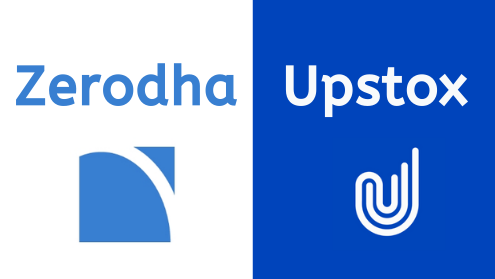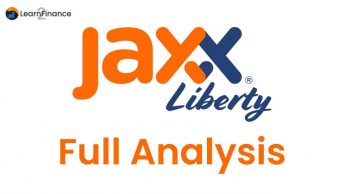Serious technological advancement has been noticed in stock markets, which are now nearly totally automated. It is becoming simpler to conduct financial market transactions using portable devices such as laptops and smartphones. Lets talk about Zerodha vs Upstox in this Article.
With increased ease of operation comes more competition to provide effective brokerage services. The present number of brokerage firms is far more than in the past when there were a restricted number of businesses, and it is growing on a daily basis. The new-age brokerage businesses offer strong commercial acumen as well as some of the best technological assistance.
When we consider today’s new-age brokerage businesses, Zerodha and Upstox are generally the first names that come to mind. In this section, we investigate these companies and conduct an analytical comparison of their operations.
What is Zerodha?
Zerodha was founded in 2010 by Nitin Kamath, an engineer turned stockbroker and rising entrepreneur who developed the firm with his ideas and invention, and it quickly grew in popularity. It has grown to become India’s top stockbroker.
Zerodha is the largest brokerage in India. It is the largest and most popular broker, giving online flat fee discount brokerage services to invest in equity, currency, commodities, IPOs, and direct mutual funds for a flat price. For stock delivery transactions and direct mutual funds, Zerodha charges no brokerage. It charges a flat Rs 20 or 0.03 per cent (whichever is lesser) every intraday and F&O trade. The highest brokerage you may pay with Zerodha for any transaction is Rs 20 for an order (of any size, amount or segment).
Zerodha offers a number of free applications that cater to the various demands of its clientele. It provides a number of tools that aid in the execution of better trades through the use of various techniques. The platform is well-known for providing exceptional customer and technical support.
What is Upstox?
Upstox is a low-cost trading organisation in India that offers trading possibilities at unbelievable pricing. The company offers trading in several areas such as stocks, commodities, currencies, futures, and options through its Upstox Pro Web and Upstox Pro Mobile trading platforms. Kalaari Capital, Ratan Tata, and GVK Davix are among the investors of Upstox. Upstox trading platform provides trading, analysis, charting, and a variety of other advanced trading capabilities.
Upstox brokerage, formerly known as RKSV, is another prominent brokerage business. It is well-known for providing great technical assistance as well as low-cost brokerage deals. Upstox provides valuable resources to its consumers for free via its mobile app Upstox Pro.
Ratan Tata believes in the Upstox group’s technological acumen and commercial approach. Clients may get reasonable customer service through the platform.
Which is better Zerodha vs Upstox?
Both Zerodha and Upstox are forward-thinking, technologically proficient, client-focused businesses recognised for providing great customer service. When investors are given the option of choosing which firm to trade with, they are bound to be perplexed because the two businesses’ business offers are so similar.
As a result, we aim to make things easy for you investors by comparing the two companies analytically:
Both Company overview:
| Details | Zerodha | Upstox |
| Incorporated in year | 2010 | 2012 |
| Broker type | Discount | Discount |
| Exchanges supported | NSE, BSE, MCX, and NCDEX | BSE, NSE, MCX |
| Offered account type | Plan for a flat brokerage fee | Upstox basic |
| Product offered | Equity, commodity, currency, futures, options | Equity, commodity, currency, futures, options. |
| Extra investment options | Mutual funds, IPO platform, bonds, and debt, exchange-traded funds | Mutual funds, IPO platform, bonds and debt, exchange-traded funds and insurance. |
| Extra features | 3 in 1 account, SMS alerts, margin against share | 3 in 1 account, SMS alerts, margin funding, margin against share. |
Zerodha Vs Upstox Charges & AMC:
| Zerodha | Upstox | |
| Trading Account Opening Charges | Rs 200 | Free |
| Trading Account AMC Charges | Rs 0 | Free |
| Demat Account Opening Charges | Rs 0 | Free |
| Demat Account AMC Charges | Rs 300 | Rs 300 |
Brokerages :
| Zerodha | Upstox | |
| Account type | Flat brokerage fee | Upstox basic |
| Equity Delivery | Rs 0 (Free) | Rs 0 (Free) |
| Equity Intraday | Rs 20 per order or .03% whichever is lower | Rs 20 per order or 0.05% whichever is lower |
| Equity Futures | Rs 20 per order or .03% whichever is lower | Rs 20 per order or 0.05% whichever is lower |
| Equity Options | Rs 20 per order | Rs 20 per order |
| Currency Futures | Rs 20 per order or .03% whichever is lower | Rs 20 per order or 0.05% whichever is lower |
| Currency Options | Rs 20 per order or .03% whichever is lower | Rs 20 per order |
| Commodity Futures | Rs 20 per order or .03% whichever is lower | Rs 20 per order or 0.05% whichever is lower |
| Commodity Options | Rs 20 per order or .03% whichever is lower | Rs 20 per order |
| Account opening links | Zerodha | Upstox |
Zerodha Vs Upstox Features:
| Account Features Compare | Zerodha | Upstox |
| 3 in 1 Account | Yes | Yes |
| Charting | Yes | Yes |
| Algo Trading | Yes | Yes |
| SMS Alerts | No | Yes |
| Online Demo | Yes | Yes |
| Online Portfolio | Yes | Yes |
| Margin Trading Funding Available | No | No |
| Combined Ledger for Equity and Commodity Yes Yes | Yes | Yes |
| Intraday Square-off Time | 3:10 PM | 3:15 PM |
| NRI Trading | Yes | No |
| Other Features | Direct Mutual Funds, APIs for Algo Trading | Option strategy builder |
Advantages and Disadvantages of using Zerodha:
Advantages:
- In terms of active clients and exchange volume, India’s No. 1 broker.
- Safe, dependable, and India’s most technologically advanced broker.
- Brokerage services with simple flat fees across segments and exchanges (BSE, NSE, MCX).
- Trades in free equity delivery. There are no brokerage fees for Cash-N-Carry orders.
- For all other categories, the brokerage fee is Rs 20 per trade.
- Excellent trading platforms (Kite) are freely available.
- Direct Mutual Fund Investing is one option.
- Orders for Good Till Triggered (GTT) are now available. These are comparable to GTC orders.
- There is an NRI trading account accessible.
Disadvantages:
- It does not offer stock recommendations, research, or advice.
- Call & Trade orders are charged an additional Rs 50 per order.
- Auto Square off is an additional Rs 50 per order.
- It does not provide a three-in-one account.
- It does not provide month-to-month unlimited trading programmes.
- It does not provide a free AMC Demat account.
- There is no margin money.
Advantages and Disadvantages of using Upstox:
Advantages:
- There is no account opening charge.
- There is no commission for trading in Equity Delivery (Cash & Carry).
- Mutual funds and digital gold investments have no brokerage fees.
- For all other categories, the brokerage fee is Rs 20 per trade.
- Provide direct mutual funds.
- Trading software for mobile and web browsers is available for free.
- One app for trading stocks, currencies, and commodities.
- There is a margin against the share available.
- There are online IPOs, FPOs, Bonds, and NCDs accessible.
Disadvantages:
- There is no margin money.
- It does not support the ‘Good Till Canceled’ order type.
- It does not have BTST capability.
- There are no unlimited monthly subscriptions available.
- There are no stock recommendations or advice.
- It charges an extra cost for call and trade.
- It charges an extra cost for the broker’s auto-square-off.
- Increased Demat debit transaction fees.
- Upstox does not provide NRI Trading or Demat Accounts.
Conclusion:
Upstox and Zerodha provide comparable products and services. They offer nearly comparable brokerage plans and a great trading platform. According to the preceding study, Zerodha does not recoup clearing charges from its clients. This is due to the fact that it is a self-clearing broker. Both trading platforms are one-of-a-kind and provide excellent customer service.
This page gives an overview of the two platforms’ characteristics and offers.








